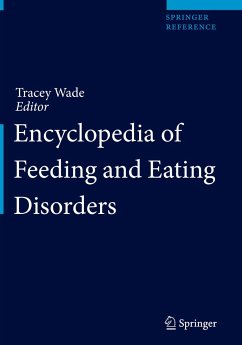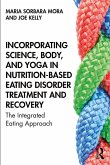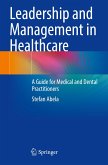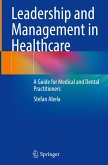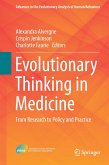Encyclopedia of Feeding and Eating Disorders
Herausgegeben:Wade, Tracey
Encyclopedia of Feeding and Eating Disorders
Herausgegeben:Wade, Tracey
- Gebundenes Buch
- Merkliste
- Auf die Merkliste
- Bewerten Bewerten
- Teilen
- Produkt teilen
- Produkterinnerung
- Produkterinnerung
The field of feeding and eating disorders represents one of the most challenging areas in mental health, covering childhood, adolescent and adult manifestations of the disorders and requiring expertise in both the physical and psychological issues that can cause, maintain, and exacerbate these disorders. The scope of the book is an overview of all the feeding and eating disorders from "bench to bedside", incorporating recent changes introduced into the Diagnostic and Statistical Manual of Mental Disorders, Fifth Edition (DSM-5). The aim is to present one of the first complete overviews of the…mehr
Andere Kunden interessierten sich auch für
![Incorporating Science, Body, and Yoga in Nutrition-Based Eating Disorder Treatment and Recovery Incorporating Science, Body, and Yoga in Nutrition-Based Eating Disorder Treatment and Recovery]() Maria Sorbara MoraIncorporating Science, Body, and Yoga in Nutrition-Based Eating Disorder Treatment and Recovery163,99 €
Maria Sorbara MoraIncorporating Science, Body, and Yoga in Nutrition-Based Eating Disorder Treatment and Recovery163,99 €![Writing and Publishing a Scientific Research Paper Writing and Publishing a Scientific Research Paper]() Writing and Publishing a Scientific Research Paper67,99 €
Writing and Publishing a Scientific Research Paper67,99 €![Meine Frau hat Krebs Meine Frau hat Krebs]() Tanja ZimmermannMeine Frau hat Krebs19,99 €
Tanja ZimmermannMeine Frau hat Krebs19,99 €![Fit und gesund von 1 bis Hundert mit Ernährung und Bewegung Fit und gesund von 1 bis Hundert mit Ernährung und Bewegung]() Dietger MathiasFit und gesund von 1 bis Hundert mit Ernährung und Bewegung34,99 €
Dietger MathiasFit und gesund von 1 bis Hundert mit Ernährung und Bewegung34,99 €![Leadership and Management in Healthcare Leadership and Management in Healthcare]() Stefan AbelaLeadership and Management in Healthcare87,99 €
Stefan AbelaLeadership and Management in Healthcare87,99 €![Leadership and Management in Healthcare Leadership and Management in Healthcare]() Stefan AbelaLeadership and Management in Healthcare118,99 €
Stefan AbelaLeadership and Management in Healthcare118,99 €![Evolutionary Thinking in Medicine Evolutionary Thinking in Medicine]() Evolutionary Thinking in Medicine67,99 €
Evolutionary Thinking in Medicine67,99 €-
-
-
The field of feeding and eating disorders represents one of the most challenging areas in mental health, covering childhood, adolescent and adult manifestations of the disorders and requiring expertise in both the physical and psychological issues that can cause, maintain, and exacerbate these disorders. The scope of the book is an overview of all the feeding and eating disorders from "bench to bedside", incorporating recent changes introduced into the Diagnostic and Statistical Manual of Mental Disorders, Fifth Edition (DSM-5). The aim is to present one of the first complete overviews of the newly defined area of feeding and eating disorders with respect to genetics, biology and neuroscience through to theory and its application in developing clinical approaches to the prevention and treatment of feeding and eating disorders.
Produktdetails
- Produktdetails
- Verlag: Springer / Springer Nature Singapore / Springer, Berlin
- Artikelnr. des Verlages: 978-981-287-103-9
- 1st ed. 2017
- Seitenzahl: 936
- Erscheinungstermin: 15. Juni 2017
- Englisch
- Abmessung: 260mm x 183mm x 52mm
- Gewicht: 2059g
- ISBN-13: 9789812871039
- ISBN-10: 9812871039
- Artikelnr.: 40823646
- Herstellerkennzeichnung Die Herstellerinformationen sind derzeit nicht verfügbar.
- Verlag: Springer / Springer Nature Singapore / Springer, Berlin
- Artikelnr. des Verlages: 978-981-287-103-9
- 1st ed. 2017
- Seitenzahl: 936
- Erscheinungstermin: 15. Juni 2017
- Englisch
- Abmessung: 260mm x 183mm x 52mm
- Gewicht: 2059g
- ISBN-13: 9789812871039
- ISBN-10: 9812871039
- Artikelnr.: 40823646
- Herstellerkennzeichnung Die Herstellerinformationen sind derzeit nicht verfügbar.
Dr. Tracey Wade is a Professor and Dean of the School of Psychology at Flinders University. She has worked as a clinician in the area of eating disorders for over 20 years and was awarded the Ian M Campbell memorial prize for outstanding contribution to the scientific or professional status of Clinical Psychology in Australia in 2000 and in 2003 she was awarded the Australian Psychological Society Early Career Award. Her research interests are in the aetiology, prevention and treatment of eating disorders and she has over 120 publications in peer reviewed journals, is co-author on two books outlining therapeutic approaches for perfectionism, and has co-authored 9 book chapters in the area of eating disorders. She is a fellow of the Academy of Eating Disorders, a member of the Eating Disorder Research Society, and a member of the Australian Psychological Society. She is currently serving as Editor-in-Chief on the Australian Psychological Society journal "Clinical Psychologist" and is on the editorial boards of the following journals: "International Journal of Eating Disorders", "European Eating Disorder Review" and "Journal of Eating Disorders".
Acculturation to Western Culture in the Context of Eating Disorders
Adaptations of Cognitive-Behavioral Therapy for In- and Day-Patient Work
Binge Eating Scale (BES)
Binge-Eating Disorder
Bipolar Disorder and Eating Disorders
Bone Health
Classification: The Transdiagnostic Perspective
Clinical Impairment Assessment Questionnaire (CIA)
Clinician Delivery (or Not) of Evidence-Based Treatments
Cognitive Analytic Therapy (CAT) for Eating Disorders
Comorbidity of Attention-Deficit/Hyperactivity Disorder and Eating Disorders
Deep Brain Stimulation for Patients with Eating Disorders
Depressive Disorders
Dissociation and Dissociative Disorders
Dutch Eating Behavior Questionnaire (DEBQ)
Early Intervention for Eating Disorders
Early Weight Gain as a Predictor of Outcome in Adolescent AnorexiaNervosa
Eating Attitudes Test
Eating Disorder Assessment (EDA-5)
Eating Disorder Belief Questionnaire
Effectiveness of Programs in Real-World Settings
Electrolytes and Eating Disorders
Emotion Expression in Individuals with Feeding and Eating Disorders
Family Environment and Interactions and Parenting Style
Family Meal in Family Therapy for Anorexia Nervosa: Is It Important?
Family-Based Treatment
Gastric Emptying and Upper Gastrointestinal Symptoms in Anorexia Nervosa
Gene x Environment Interactions
General Practitioner, Role of
Illness Stage
Impact of Psychiatric Comorbidity on Eating Disorder Outcomes
Implicit Measures
Key Therapeutic Role of Nutrition Across Therapies and Settings
Laboratory Meal Assessment
Management of the Special Needs of Students with Eating Disorders
Medications for Eating Disorders
Mindfulness and Acceptance-Based Prevention of Eating Disorders
Moderators and Mediators
Munich ED-Quest
Nasogastric Refeeding
Neurocognitive Styles in Eating Disorders
Neuromodulation Treatments
Obesity
Obesity and Eating Disorders
Obsessive-Compulsive Personality Disorder as a Risk Factor for Eating Disorders
Outreach Programs: An Alternative Model of Care for Individuals with Enduring Eating Disorders
Oxytocin in Feeding and Eating Disorders, Role of
Parent Influences on Body Image Attitudes and Eating Patterns in Early Childhood
Peer Interactions and Relationships
Prevention Programs with High-Risk Populations
Psychodynamic Model
Recovery stories, Role in treatment
Refeeding
Relapse Prevention
Schema Therapy with Eating Disorders
Self-Compassion as Protective Factor
Starvation in Children, Adolescents, and Young Adults: Relevance to Eating Disorders
Structured Clinical Interview for DSM-IV (SCID)
Technology in Assessment and Treatment
Therapeutic Alliance in the Treatment of Eating Disorders
Transdiagnostic Prevention of Eating Disorders
Translating Efficacy into Effectiveness
Treating Adolescent Anorexia Nervosa when Family-Based Treatment Is Insufficient or Contraindicated
Universal Prevention
Use of Virtual Reality Methods in Treating Eating Disorders and Body Image
Web-Based Approaches to Prevention
Weighing as Treatment for Eating Disorders
Weight and Shape Concern and Body Image as Risk Factors for Eating Disorders
Adaptations of Cognitive-Behavioral Therapy for In- and Day-Patient Work
Binge Eating Scale (BES)
Binge-Eating Disorder
Bipolar Disorder and Eating Disorders
Bone Health
Classification: The Transdiagnostic Perspective
Clinical Impairment Assessment Questionnaire (CIA)
Clinician Delivery (or Not) of Evidence-Based Treatments
Cognitive Analytic Therapy (CAT) for Eating Disorders
Comorbidity of Attention-Deficit/Hyperactivity Disorder and Eating Disorders
Deep Brain Stimulation for Patients with Eating Disorders
Depressive Disorders
Dissociation and Dissociative Disorders
Dutch Eating Behavior Questionnaire (DEBQ)
Early Intervention for Eating Disorders
Early Weight Gain as a Predictor of Outcome in Adolescent AnorexiaNervosa
Eating Attitudes Test
Eating Disorder Assessment (EDA-5)
Eating Disorder Belief Questionnaire
Effectiveness of Programs in Real-World Settings
Electrolytes and Eating Disorders
Emotion Expression in Individuals with Feeding and Eating Disorders
Family Environment and Interactions and Parenting Style
Family Meal in Family Therapy for Anorexia Nervosa: Is It Important?
Family-Based Treatment
Gastric Emptying and Upper Gastrointestinal Symptoms in Anorexia Nervosa
Gene x Environment Interactions
General Practitioner, Role of
Illness Stage
Impact of Psychiatric Comorbidity on Eating Disorder Outcomes
Implicit Measures
Key Therapeutic Role of Nutrition Across Therapies and Settings
Laboratory Meal Assessment
Management of the Special Needs of Students with Eating Disorders
Medications for Eating Disorders
Mindfulness and Acceptance-Based Prevention of Eating Disorders
Moderators and Mediators
Munich ED-Quest
Nasogastric Refeeding
Neurocognitive Styles in Eating Disorders
Neuromodulation Treatments
Obesity
Obesity and Eating Disorders
Obsessive-Compulsive Personality Disorder as a Risk Factor for Eating Disorders
Outreach Programs: An Alternative Model of Care for Individuals with Enduring Eating Disorders
Oxytocin in Feeding and Eating Disorders, Role of
Parent Influences on Body Image Attitudes and Eating Patterns in Early Childhood
Peer Interactions and Relationships
Prevention Programs with High-Risk Populations
Psychodynamic Model
Recovery stories, Role in treatment
Refeeding
Relapse Prevention
Schema Therapy with Eating Disorders
Self-Compassion as Protective Factor
Starvation in Children, Adolescents, and Young Adults: Relevance to Eating Disorders
Structured Clinical Interview for DSM-IV (SCID)
Technology in Assessment and Treatment
Therapeutic Alliance in the Treatment of Eating Disorders
Transdiagnostic Prevention of Eating Disorders
Translating Efficacy into Effectiveness
Treating Adolescent Anorexia Nervosa when Family-Based Treatment Is Insufficient or Contraindicated
Universal Prevention
Use of Virtual Reality Methods in Treating Eating Disorders and Body Image
Web-Based Approaches to Prevention
Weighing as Treatment for Eating Disorders
Weight and Shape Concern and Body Image as Risk Factors for Eating Disorders
Acculturation to Western Culture in the Context of Eating Disorders
Adaptations of Cognitive-Behavioral Therapy for In- and Day-Patient Work
Binge Eating Scale (BES)
Binge-Eating Disorder
Bipolar Disorder and Eating Disorders
Bone Health
Classification: The Transdiagnostic Perspective
Clinical Impairment Assessment Questionnaire (CIA)
Clinician Delivery (or Not) of Evidence-Based Treatments
Cognitive Analytic Therapy (CAT) for Eating Disorders
Comorbidity of Attention-Deficit/Hyperactivity Disorder and Eating Disorders
Deep Brain Stimulation for Patients with Eating Disorders
Depressive Disorders
Dissociation and Dissociative Disorders
Dutch Eating Behavior Questionnaire (DEBQ)
Early Intervention for Eating Disorders
Early Weight Gain as a Predictor of Outcome in Adolescent AnorexiaNervosa
Eating Attitudes Test
Eating Disorder Assessment (EDA-5)
Eating Disorder Belief Questionnaire
Effectiveness of Programs in Real-World Settings
Electrolytes and Eating Disorders
Emotion Expression in Individuals with Feeding and Eating Disorders
Family Environment and Interactions and Parenting Style
Family Meal in Family Therapy for Anorexia Nervosa: Is It Important?
Family-Based Treatment
Gastric Emptying and Upper Gastrointestinal Symptoms in Anorexia Nervosa
Gene x Environment Interactions
General Practitioner, Role of
Illness Stage
Impact of Psychiatric Comorbidity on Eating Disorder Outcomes
Implicit Measures
Key Therapeutic Role of Nutrition Across Therapies and Settings
Laboratory Meal Assessment
Management of the Special Needs of Students with Eating Disorders
Medications for Eating Disorders
Mindfulness and Acceptance-Based Prevention of Eating Disorders
Moderators and Mediators
Munich ED-Quest
Nasogastric Refeeding
Neurocognitive Styles in Eating Disorders
Neuromodulation Treatments
Obesity
Obesity and Eating Disorders
Obsessive-Compulsive Personality Disorder as a Risk Factor for Eating Disorders
Outreach Programs: An Alternative Model of Care for Individuals with Enduring Eating Disorders
Oxytocin in Feeding and Eating Disorders, Role of
Parent Influences on Body Image Attitudes and Eating Patterns in Early Childhood
Peer Interactions and Relationships
Prevention Programs with High-Risk Populations
Psychodynamic Model
Recovery stories, Role in treatment
Refeeding
Relapse Prevention
Schema Therapy with Eating Disorders
Self-Compassion as Protective Factor
Starvation in Children, Adolescents, and Young Adults: Relevance to Eating Disorders
Structured Clinical Interview for DSM-IV (SCID)
Technology in Assessment and Treatment
Therapeutic Alliance in the Treatment of Eating Disorders
Transdiagnostic Prevention of Eating Disorders
Translating Efficacy into Effectiveness
Treating Adolescent Anorexia Nervosa when Family-Based Treatment Is Insufficient or Contraindicated
Universal Prevention
Use of Virtual Reality Methods in Treating Eating Disorders and Body Image
Web-Based Approaches to Prevention
Weighing as Treatment for Eating Disorders
Weight and Shape Concern and Body Image as Risk Factors for Eating Disorders
Adaptations of Cognitive-Behavioral Therapy for In- and Day-Patient Work
Binge Eating Scale (BES)
Binge-Eating Disorder
Bipolar Disorder and Eating Disorders
Bone Health
Classification: The Transdiagnostic Perspective
Clinical Impairment Assessment Questionnaire (CIA)
Clinician Delivery (or Not) of Evidence-Based Treatments
Cognitive Analytic Therapy (CAT) for Eating Disorders
Comorbidity of Attention-Deficit/Hyperactivity Disorder and Eating Disorders
Deep Brain Stimulation for Patients with Eating Disorders
Depressive Disorders
Dissociation and Dissociative Disorders
Dutch Eating Behavior Questionnaire (DEBQ)
Early Intervention for Eating Disorders
Early Weight Gain as a Predictor of Outcome in Adolescent AnorexiaNervosa
Eating Attitudes Test
Eating Disorder Assessment (EDA-5)
Eating Disorder Belief Questionnaire
Effectiveness of Programs in Real-World Settings
Electrolytes and Eating Disorders
Emotion Expression in Individuals with Feeding and Eating Disorders
Family Environment and Interactions and Parenting Style
Family Meal in Family Therapy for Anorexia Nervosa: Is It Important?
Family-Based Treatment
Gastric Emptying and Upper Gastrointestinal Symptoms in Anorexia Nervosa
Gene x Environment Interactions
General Practitioner, Role of
Illness Stage
Impact of Psychiatric Comorbidity on Eating Disorder Outcomes
Implicit Measures
Key Therapeutic Role of Nutrition Across Therapies and Settings
Laboratory Meal Assessment
Management of the Special Needs of Students with Eating Disorders
Medications for Eating Disorders
Mindfulness and Acceptance-Based Prevention of Eating Disorders
Moderators and Mediators
Munich ED-Quest
Nasogastric Refeeding
Neurocognitive Styles in Eating Disorders
Neuromodulation Treatments
Obesity
Obesity and Eating Disorders
Obsessive-Compulsive Personality Disorder as a Risk Factor for Eating Disorders
Outreach Programs: An Alternative Model of Care for Individuals with Enduring Eating Disorders
Oxytocin in Feeding and Eating Disorders, Role of
Parent Influences on Body Image Attitudes and Eating Patterns in Early Childhood
Peer Interactions and Relationships
Prevention Programs with High-Risk Populations
Psychodynamic Model
Recovery stories, Role in treatment
Refeeding
Relapse Prevention
Schema Therapy with Eating Disorders
Self-Compassion as Protective Factor
Starvation in Children, Adolescents, and Young Adults: Relevance to Eating Disorders
Structured Clinical Interview for DSM-IV (SCID)
Technology in Assessment and Treatment
Therapeutic Alliance in the Treatment of Eating Disorders
Transdiagnostic Prevention of Eating Disorders
Translating Efficacy into Effectiveness
Treating Adolescent Anorexia Nervosa when Family-Based Treatment Is Insufficient or Contraindicated
Universal Prevention
Use of Virtual Reality Methods in Treating Eating Disorders and Body Image
Web-Based Approaches to Prevention
Weighing as Treatment for Eating Disorders
Weight and Shape Concern and Body Image as Risk Factors for Eating Disorders

